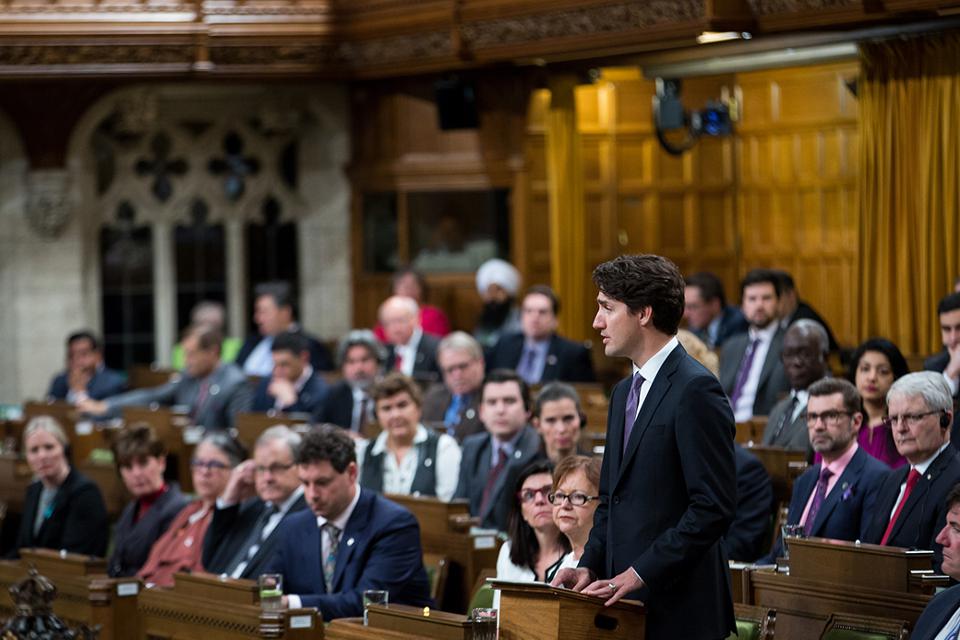Earlier this month, Nathan Cullen, New Democratic MP for Skeena-Bulkley Valley and critic for democratic reform, held a town hall meeting in Winnipeg as part of a cross-country tour to engage citizens on electoral reform.
Wait, you might be thinking — isn’t electoral reform dead? Didn’t Prime Minister Justin Trudeau wipe it from the government’s agenda back in February?
Kind of, but it’s not that simple. While Trudeau attempted to abandon his campaign promise of electoral reform in early February, a window of opportunity for action to strengthen our democracy remains. But that window is closing — in less than a month MPs will vote on whether to move electoral reform forward or toss it aside.
It is easy to be cynical, to chastise Trudeau for yet another broken promise, to turn our backs on him as he’s done to us.
But let’s not lose sight of the fact that we still have a critical opportunity to affect change. The next step on electoral reform is actually a golden opportunity for our democracy to function as it should. Rather than toeing the party line, Members of Parliament have the chance to represent their constituents and hold the prime minister accountable to his promises by voting in favour of electoral reform on May 31.
A brief look back at the dialogue on electoral reform in Canada over the last two years shows us just how crucial this window is, and how we, as constituents, can influence the outcome.
Electoral reform: the promise
“We are committed to ensuring that 2015 will be the last federal election conducted under the first-past-the-post voting system.”
That was the Liberals’ (in)famous campaign promise. Someone tried to count how many times Trudeau repeated the commitment and gave up at 1,653. This was not a casual campaign promise, but a cornerstone of the Liberals’ platform. A clear commitment. No contingencies, no caveats.
So it’s not surprising that when Trudeau quietly scrubbed electoral reform from the agenda in February, the public outcry echoed from coast to coast.
“A clear preference for a new electoral system, let alone a consensus, has not emerged,” Trudeau wrote in a new mandate letter to Democratic Institutions Minister Karina Gould.
This came after more than six months of work by the House of Commons special committee on electoral reform, composed of MPs from all five parties, engaging Canadians across the country and experts from around the world. The committee released a 300-plus page report that illustrates clear consensus among experts that our system should be more proportional, consensus among Canadians on the need for more government co-operation across party lines, and consensus among parties on a process for changing the system.
After almost two years of reiterating the commitment, months of work, over half a million dollars invested in the special committee, and widespread support for reform to strengthen our democracy, the promise was broken. It seemed to come as a surprise not only to the public but also Liberal MPs, many of whom were also elected on that promise.
In the same week as the announcement, I found a newsletter from my Liberal MP for Winnipeg Central, Robert Falcon-Ouellette, with a front-page article engaging constituents on the issue. Another Liberal MP wrote an article apologizing to his constituents for the broken promise.
Perhaps some predicted this would happen, based on the pile of other commitments that have been abandoned by the Liberals in their first 18 months in office. To take just one example, after promising to fully adopt and implement the UN Declaration on the Rights of Indigenous Peoples and respect Indigenous communities’ right to prior and informed consent on resource development projects, as well as vowing to overhaul the gutted Environmental Assessment process, the Trudeau government approved two new pipelines without consent or proper review.
By some counts, the government has already broken 30 promises. The tides of public opinion are turning on our new prime minister as he backs away from more and more campaign commitments. Headlines like “10 key promises Trudeau has broken since becoming PM” and “Stop swooning over Justin Trudeau. The man is a disaster for the planet” reflect this wave of growing skepticism.
But we have to look for the light. Opportunities exist to win action on these promises.
On May 31, the all-party committee’s report on democratic reform will be voted on in the House of Commons. MPs will decide whether to act on the report or abandon the commitment to reform.
The four opposition parties are generally in support of moving forward with electoral reform. So, assuming most Conservative, NDP, Green and Bloc MPs will vote in favour, the outcome lies in the hands of Liberal MPs. Trudeau has said it’s their responsibility to be “your voice in Ottawa.”
So, will they stand with their constituents or toe the party line?
There are reasons to believe many Liberal MPs will speak up on the issue and vote in favour of reform.
First, because most of them (about 80 per cent) were newly elected in 2015 and they realize — and we are reminding them — that this was a central campaign promise which many of them adopted and reiterated. In other words, there are votes at stake. Particularly from those constituents who would have liked to vote Green or NDP but voted Liberal based on the promise that the next election would be under a more proportional system in which a minority vote would count.
Secondly, several Liberal MPs have repeated their commitment to the principle of electoral reform despite Trudeau’s back-pedalling. If some Liberal MPs pledge to support electoral reform on May 31, others may be emboldened to do the same.
And finally, there is recent precedent for Liberal MPs to vote independently, as seen in the vote on a bill that would bar insurance companies from forcing clients to reveal the results of genetic testing. Trudeau opposed the bill, but most Liberal backbenchers voted in favour.
We can save electoral reform. But only if concerned constituents draw attention to the issue before the vote at the end of this month.
The window of opportunity to make our voices heard is not open for long. It is crucial that we reach out to Liberal MPs in our ridings and neighbouring ridings and urge them to represent their constituents in this vote.
Drop by the office, make a call, send an email, write a letter. Remind them of where you stand, so when they go to the House on May 31, the voices of their constituents will be louder than that of the party.
If we want a representative electoral system in our near future, it is our only hope. ![]()
Read more: Politics
















Tyee Commenting Guidelines
Comments that violate guidelines risk being deleted, and violations may result in a temporary or permanent user ban. Maintain the spirit of good conversation to stay in the discussion.
*Please note The Tyee is not a forum for spreading misinformation about COVID-19, denying its existence or minimizing its risk to public health.
Do:
Do not: